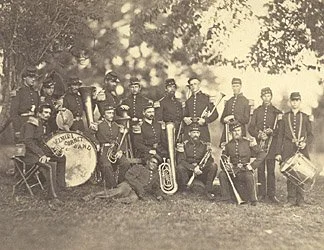The Star-Spangled Banner: Our Tribute to the Sacrifice of Guardians on 9/11
Our iconic national anthem, The Star-Spangled Banner, is more than just a musical composition — it’s a testament to the resilience and sacrifice that has shaped us as a nation.
Composed by Francis Scott Key in 1814, the national anthem gained official status in 1931, embedding the lyrics into our national identity.
The significance of our anthem isn’t just confined to one historical event — it extends to moments throughout our history that remind us of what it means to be an American, like this heartfelt rendition of the song played by veteran Brian Freeman in honor of the guardians who made the ultimate sacrifice in service of others on 9/11.
Scroll to read, or click to jump to a specific section:
The History of The Star-Spangled Banner
Our national anthem’s origins lie in The War of 1812, where Francis Scott Key, a 35-year-old lawyer and amateur poet, found himself on a British ship in September 1814, seeking the release of a detained friend.
Key’s negotiations for his friend were successful, but because of his awareness of the British plans for attacking Baltimore, he was not allowed to return to land until the assault was concluded. It was from this unique vantage point on that historic September night that Key witnessed the relentless bombardment of Fort McHenry.
The sight that erupted before Key at dawn was nothing short of miraculous in the eyes of the poet — despite the intensity of the British assault, the fort’s defenders held strong, and the American Flag remained, waving defiantly over Fort McHenry.
This moment of unexpected victory and enduring courage moved Key, inspiring him to pen the initial lines of what would become our national anthem.
The enduring words that culminate in the powerful lines, “O! say does that star-spangled Banner yet wave, O'er the Land of the free and the home of the brave?" have become a symbol of American resilience and unity as well as a reminder of all the triumphs and tragedies that have brought us together as a nation.
(Above images from the National Museum of American History, with full lyrics.)
The Star spangled banner national song (music cover). Stackpole, 1861. Prints and Photographs Division, Library of Congress.
Becoming the National Anthem
On July 26, 1889, the Secretary of the Navy designated "The Star Spangled Banner" as the official tune to be played at the raising of the flag. And during Woodrow Wilson's presidency, it was chosen by the White House to be played wherever a national anthem was appropriate.
Still the song was variously criticized as too violent in tone, too difficult to sing, and, by prohibitionists, as basically a drinking song. But on its side "The Star Spangled Banner" had a strong supporter in John Philip Sousa who, in 1931, opined that besides Key's "soul-stirring" words, "it is the spirit of the music that inspires."
That same year, on March 3 [1931], President Herbert C. Hoover signed the Act establishing Key's poem and Smith's music as the official anthem of the United States.
A Moving Tribute to Our Veterans and First Responders
Our rendition of The Star-Spangled Banner was performed by veteran Brian Freeman in honor of the guardians who made the ultimate sacrifice in service of others on 9/11 and for those who continue to suffer from physical, mental, and emotional challenges from that day and the decades that have followed.
“This was the first time I ever played the Star-Spangled Banner. It meant so much to me, and I was so honored to get to do it. I was extremely nervous because I was thinking about all of my Army brothers and those who have sacrificed their lives for our country, and I wanted to get it right for them.”
Brian is originally from Dublin, Ireland. He joined the US Army after going to the Twin Towers in the aftermath of 9/11 to help out on the pile. Brian has been playing guitar since he was 16 and has been the Lead Musician for Encore’s jam sessions in Beacon, New York. He recently recorded a set of his original songs that will be released soon on Guardian Revival Records. For his performance of the Star-Spangled Banner, Brian played his Gretsch Chet Atkins guitar.
About Encore
Encore provides veterans & first responders with (free) opportunities to learn, write, play, record, and share music with their peers and the rest of the world.
JAMS: Regular sessions of casual community-based music experiences hosted by a trained Lead Musician. Guardians of any skill level are welcome to join — using their own instrument or one of ours. Come jam with us in Beacon NY, Mahopac NY, Manhattan NYC, and Billings MT.
LESSONS: We offer beginner to advanced guitar, ukulele, bass, and piano lessons via zoom. Lessons will start at your level & go at your pace, based on your individual goals and objectives with music. You can also learn basic music theory, if interested.
RETREATS: Led by a music therapist, these 3-day retreats offer guardians the opportunity to immerse in music together, providing a chance to reset through music & community.
TRACKS: A unique experience where we facilitate professional songwriting, recording, and releasing of a guardian’s original music. This opportunity to share their story helps them process emotions as well as offer a potential professional path forward with music.
Through our Tracks experience, we work with a guardian on professional songwriting, recording, and releasing their original music on our label, Guardian Revival Records (available on all streaming platforms).





